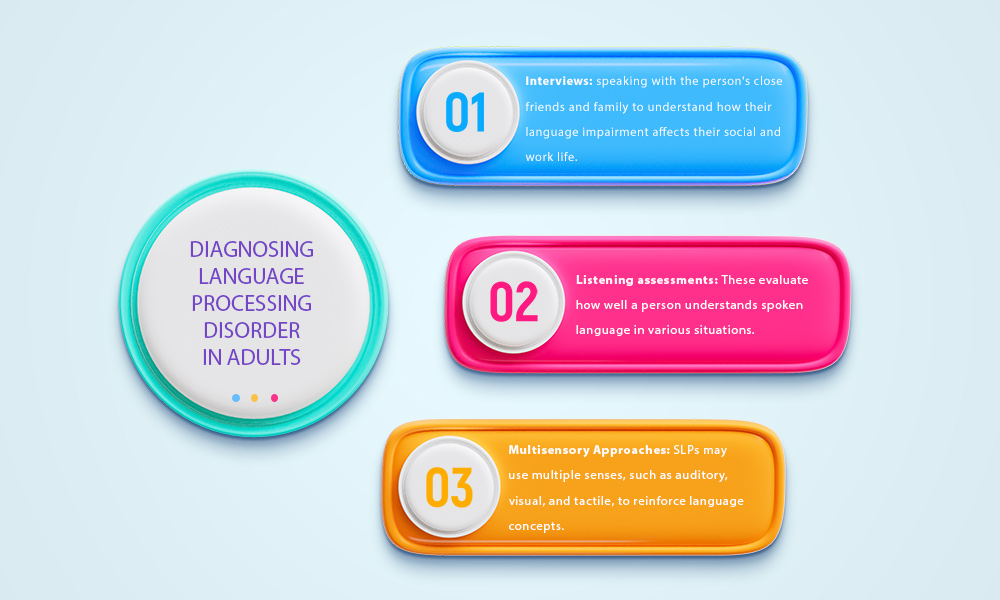Language processing disorder (LPD) is a brain-based condition that makes it difficult for someone to express themselves or make sense of what is being said to them. While much of the information published on language processing disorder (LPD) focuses on children, it is important to recognize that language processing disorder in adults is also a significant concern. Adults, like children, can experience LPD, impacting both their expressive and receptive language abilities. LPD in adults can manifest through various challenges. Researchers have not yet pinpointed the exact cause of language processing disorders in adults or children. However, existing research suggests that genetics play a role: up to 40 percent of those with a family history of language processing disorders are affected, compared to just 4 percent of individuals with no family history of such conditions. The purpose of this essay is to explore the nature of Language Processing Disorder in adults, examining its symptoms, causes, and the challenges it presents.
Table of Contents
What Is Language Processing?
In psycholinguistics, language processing refers to how humans use words to communicate ideas and feelings, and how these communications are processed and understood. Language processing is considered a unique human ability that is not seen with the same grammatical understanding or systematicity in even our closest primate relatives. A verbal and written language processing disorder in adults can affect their ability to communicate effectively.
What is a Language Processing Disorder?

Language Processing Disorder (LPD) is a type of learning disability that affects an individual’s ability to understand, express, and process language, even though they may have normal intelligence and no hearing or speech problems. People with LPD have difficulty in understanding and using spoken and written language, which can make communication and learning challenging. LPD can affect various aspects of language, such as grammar, vocabulary, syntax, and semantics. The severity and type of LPD can vary widely from person to person, but early identification and appropriate treatment can help individuals with LPD to overcome their challenges and improve their language skills.
Language Processing Disorder is primarily concerned with how the brain processes spoken or written language, rather than the physical ability to hear or speak. People with LPD struggle to comprehend the meaning of words, sentences, and narratives because they find it challenging to process the information they receive. For example, a person with LPD may have trouble understanding a joke or a sarcastic comment. This can make things very frustrating for the individual, especially when “They find themselves unable to communicate their thoughts and ideas to others.
Type of language processing disorder in adults
What are examples of language disorders? Some examples of language disorders include:
Expressive language disorder
Difficulty expressing thoughts and needs through language. Children with this disorder may:
- Have a small vocabulary
- Use short sentences with incorrect word order
- Leave out words or use filler words like “um”
- Use incorrect tenses
Developmental language disorder
Children with this disorder may struggle with using complex sentences, understanding figurative language, and reading. They may also exhibit disorganized writing and storytelling and frequently make grammatical and spelling errors. receptive language processing disorder in adults is developmental. The signs can show up as early as preschool and continue into adulthood. Kids who struggle with receptive language often have trouble with expressive language, too. People can be diagnosed with receptive language disorder at any age.
here are, Developmental language disorder and its neural basis with Dorothy Bishop (Emeritus Professor of Developmental Neuropsychology at the University of Oxford):
Spasmodic dysphonia
A chronic voice disorder causes spasms in the vocal cords during speech, resulting in a shaky, hoarse, or tight voice.
What are the symptoms of language processing disorder?

Symptoms of Language Processing Disorder vary widely from person to person.
Expressive language processing disorder in adults will indicate itself by:
- Struggles to form sentences
- limited vocabulary
- repetition
- disorganized thoughts
- writing issues
- communication-related frustration
- Limited vocabulary for their age
- Using filler words like “um,” or “stuff” and “things” instead of more specific words
- Confusion with verb tenses
- Repeating phrases when telling a story or answering a question
- Frequently saying sentences that don’t make sense
- Difficulty learning new words
- Feeling like words are constantly stuck “at the tip of their tongue”
- Frustration with their inability to communicate thoughts
- Disinterest in conversations or social situations
- Difficulty following directions
- Misunderstanding what is asked and answering or acting inappropriately
- Difficulty getting jokes
- Seeming shy or withdrawn
Language processing disorder in Adult Symptoms in adults can vary widely, affecting communication abilities. The condition usually follows general developmental patterns and guidelines.
What are the causes of language processing disorder?

What causes language processing disorder? Causes of Language Processing Disorders include hearing loss, brain injury, or a lack of exposure to language. However, the cause is often unknown. Although researchers don’t know the exact cause of LPD, there does appear to be a hereditary link. About 40% of cases have a family connection, in which a relative also has LPD. LPD can also result from a stroke, traumatic brain injury, or other forms of brain damage.
Language processing disorders (LPDs) can have many causes, including:
- Genetics
LPDs can be hereditary and run in families.
- Brain damage
LPDs can result from brain injuries, strokes, tumors, or other forms of brain damage.
- Pregnancy and birth complications
LPDs may be caused by complications during pregnancy or birth, such as low birth weight, premature birth, or fetal alcohol syndrome.
- Environmental factors
LPDs can be caused by exposure to toxins, infections, or other environmental factors.
- Other medical conditions
LPDs can be associated with other medical conditions, such as attention deficit hyperactivity disorder (ADHD), autism spectrum disorder (ASD), or dyslexia.
- Aging
The processing of language can be impacted by aging, even in individuals who are neurologically healthy.
How to diagnose a language processing disorder in adults

During an evaluation, the speech therapist will conduct thorough tests to assess both expressive and receptive language skills. They will also interview your close family and friends to understand how your language impairment is impacting your work and social life. Following this, the speech therapist will collaborate with you to develop a treatment plan. A speech-language pathologist can diagnose language processing disorder (LPD) in adults through a comprehensive evaluation that includes:
- Listening assessments
These evaluate how well a person understands spoken language in various situations.
- Language proficiency tests
These assess vocabulary, grammar, and the ability to use and understand language.
- Memory and attention assessments
These evaluate how cognitive functions impact language processing.
- Interviews
These involve speaking with the person’s close friends and family to understand how their language impairment affects their social and work life.
Language processing disorder in adults treatment
Language processing disorder (LPD) in adults is usually treated with speech therapy, which can enhance language skills using various techniques including:
- Cognitive Skills
Speech-language pathologists (SLPs) start by focusing on fundamental skills such as listening comprehension, short-term memory, and attention.
- Expressive Language
SLPs help improve the ability to express thoughts and ideas clearly and concisely. This may include exercises to help with organization, grammar, and vocabulary.
- Receptive Language
SLPs help improve the ability to comprehend spoken language. This may include exercises to help with identifying keywords, understanding complex sentences, and inferring meaning.
- Compensatory Strategies
SLPs teach techniques to reduce the negative impact of the condition, such as word-finding strategies.
- Multisensory Approaches
SLPs may use multiple senses, such as auditory, visual, and tactile, to reinforce language concepts.
- Supportive Environment
SLPs work with individuals, families, and caregivers to create an environment that encourages language practice and improvement.
Treatment success rates for LPD in adults can be as high as 70%. It’s never too late to seek help, and treatment can make a difference in communication skills. In addition, cognitive neuropsychology– a branch of cognitive psychology that studies how the brain’s structure and function relate to psychological processes- play a crucial role in helping adults with language processing disorders (LPD) by studying the underlying cognitive mechanisms involved in language functions and identifying specific deficits.
Conclusion

Language processing disorder in adults can significantly impact communication, daily functioning, and social interactions. It involves difficulties understanding and expressing language, affecting spoken and written communication. Adults with this disorder may struggle following conversations, interpreting complex sentences, or organizing their thoughts coherently. While the exact causes of Language processing disorder can vary, early intervention and support through speech therapy, cognitive training, and communication strategies can help mitigate the effects and improve quality of life. Awareness and tailored support are essential to help adults manage the challenges associated with language processing difficulties.
References:
https://pubmed.ncbi.nlm.nih.gov/36029614
https://pubmed.ncbi.nlm.nih.gov/33660139
https://pubmed.ncbi.nlm.nih.gov/21691865
https://pubmed.ncbi.nlm.nih.gov/1483193
https://pubmed.ncbi.nlm.nih.gov/15222822



